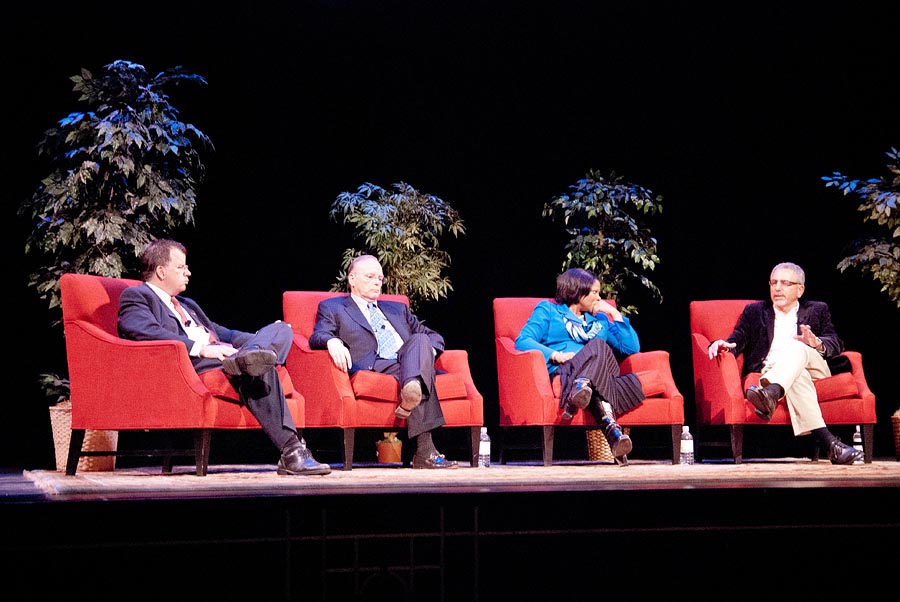The AdvantageWest panel from left to right: Dan Gerlach, Mark Erwin, Anita Brown-Graham, Mike Adams. Photo by Max Cooper.
Asheville’s creative culture fosters a lot of good business ideas, but big challenges remain to making many of those ideas come to life.
That was one of the thoughts from Mark Erwin, president of Erwin Capital and a former U.S. Ambassador, as he spoke to about 375 attendees at AdvantageWest’s Nov. 19 Economic Summit. He joined a panel of three other experts in a discussion that focused on defining and cultivating business innovation. The talk took place at Diana Wortham Theatre in downtown Asheville and was hosted by D.G. Martin, a syndicated newspaper columnist and UNC-TV host and radio personality.
Here’s some of the highlights of what each of the panelists had to say:
Mike Adams, president of Moog Music:
Adams said he tries to foster innovation at his business by seeing things through fresh eyes and being open to new ideas. A savvy, educated workforce is key to the area’s economic success, he said, noting that he thinks the education system should focus on teaching students to “think about things rather than memorize things.”
Adams also said that he feels new banking regulations could stifle some businesses’ ability to raise capital for expansions, relaying thoughts from his banker who told him that he wouldn’t be able to get the same loan now that he got several years ago.
In terms of the popular music festival that bear’s his company’s name, Moogfest, Adam’s hinted that he’d like to see it expand to include more daytime activities. In the long term, he added that he thinks the festival could help lure venture capitalists to visit and then invest in the area.
Anita Brown-Graham, director of NC’s Institute for Emerging Issues:
Generation Z “almost seems to be pre-programed to be innovators,” said Brown-Graham, “because they’ve grown up with technology defining how they see things.”
“They’re also much more risk takers than the generation before them,” she added.
However, she maintained that although younger adults might be more willing to try something new, many don’t have the business skills to successfully commercialize their ideas. It takes both good ideas and practical business skills to truly be an innovator, she said. She also noted that business innovation often takes capital, and “in this climate, lots of young people can’t find capital.”
Mark Erwin, president of Erwin Capital and a former U.S. Ambassador:
However, Erwin, who has an investment company, said he thinks “there’s plenty of capital for great ideas.” It’s just a matter of “presenting them well and having a plan for implementation,” he added.
He said innovators need to think forward and find emerging markets. Specifically, he said that he sees the fields of journalism, communications and shopping continuing to be more and more focused on the online marketplace. A former ambassador to the small nation of Mauritius off the African coast, he cautioned that they’re beating the U.S. at some innovations, noting that the entire country has dispelled land phone lines completely and successfully relies on wireless communications.
He praised Asheville’s growing beer industry as an example of a thriving, innovative business community. “All these breweries are producing innovative changes to beer,” he said. “Asheville is a very tolerant society of people who are different. That breeds creativity.”
Dan Gerlach, President of the Golden LEAF Foundation:
Adding to Erwin’s thoughts on the importance of modern communications, Gerlach said he worries that technological innovations are leaving lots of rural people behind. “A lot of people in rural Western North Carolina don’t have broadband,” he noted. “We need to work on that.”
He also added that he thinks good community colleges are key to growing the local economy. “There’s jobs out there for folks with the right training,” he noted.
However, he said that you can still be innovative without having a lot of technical skills.
“People confuse innovation with technology,” he maintained.
For folks with less tech skills, there’s huge untapped potential in the local agriculture industry to increase profits from plants that have medicinal values, he said.




Before you comment
The comments section is here to provide a platform for civil dialogue on the issues we face together as a local community. Xpress is committed to offering this platform for all voices, but when the tone of the discussion gets nasty or strays off topic, we believe many people choose not to participate. Xpress editors are determined to moderate comments to ensure a constructive interchange is maintained. All comments judged not to be in keeping with the spirit of civil discourse will be removed and repeat violators will be banned. See here for our terms of service. Thank you for being part of this effort to promote respectful discussion.